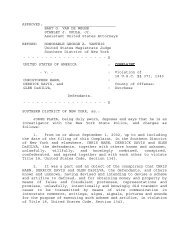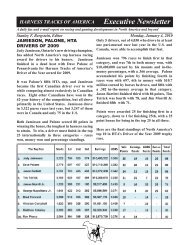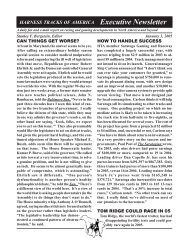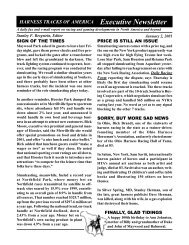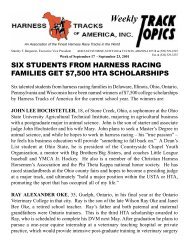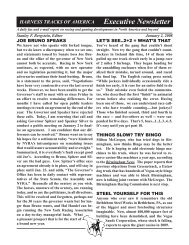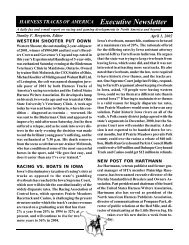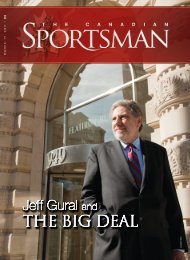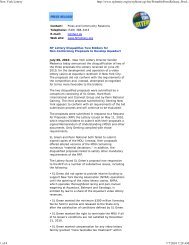2002 - Harness Tracks of America, Inc.
2002 - Harness Tracks of America, Inc.
2002 - Harness Tracks of America, Inc.
Create successful ePaper yourself
Turn your PDF publications into a flip-book with our unique Google optimized e-Paper software.
HARNESS TRACKS OF AMERICA<br />
Executive Newsletter<br />
A daily fax and e-mail report on racing and gaming developments in North <strong>America</strong> and beyond<br />
Stanley F. Bergstein, Editor<br />
BANGOR WANTS IN ON SLOTS<br />
If anyone wondered why mystery man Shawn Scott<br />
and his Las Vegas-based Capitol One LLC invested<br />
in little Bangor Raceway in Maine recently,<br />
they can stop wondering. A group led by the track<br />
plans to petition for a statewide referendum on slots<br />
at tracks in November, 2003. Although the question<br />
supposedly would allow slots at Bangor and<br />
at Scarborough Downs, a lawyer for Scarborough<br />
says the proposal does not please his client, contending<br />
it is written to benefit only Bangor Raceway.<br />
The Bangor proposal calls for Bass Park in<br />
Bangor to be renovated and a percentage <strong>of</strong> revenues<br />
to go to helping senior citizens pay for prescription<br />
drugs and help Maine students to attend<br />
college. Maine voters also will be asked, however,<br />
to legalize casino gambling for the<br />
Passamaquoddy and Penobscot Nation Indian<br />
tribes by building a $650 million casino in southern<br />
Maine. The state expects to get $100 million<br />
in revenue from that project, and as framed those<br />
payments to the state would be nullified if Maine<br />
authorizes slots at any location other than the tribal<br />
casino. A leader <strong>of</strong> an anti-gambling group, Casinos<br />
No!, says the organization will oppose both<br />
proposals, saying that more than one casino would<br />
mean the state would get nothing “except crime,<br />
corruption and congestion.” Proponents <strong>of</strong> the idea<br />
say slots at tracks would be well-regulated and a<br />
natural step in adding another form <strong>of</strong> gaming<br />
where gambling already is legal. The Bangor application<br />
for a citizens’ referendum has been submitted<br />
to Maine’s secretary <strong>of</strong> state for review.<br />
Ten percent <strong>of</strong> Maine citizens who vote in the gubernatorial<br />
election next month would be needed<br />
for the referendum to be granted, and while that<br />
number obviously is not known at present it is believed<br />
more than 50,000 signatures would be<br />
needed. A similar referendum to allow<br />
VLTs at Scarborough Downs failed by a<br />
3-2 ratio two years ago.<br />
October 23, <strong>2002</strong><br />
REMEMBER THIS STATEMENT<br />
When Atlantic City casinos start snarling and fighting<br />
about the possibility <strong>of</strong> slots at the Meadowlands,<br />
and shout that the competition would seriously<br />
injure them, remember this statement by<br />
Gary Loveman, the president <strong>of</strong> Harrah’s: “I don’t<br />
think even gaming in Philadelphia would pose a<br />
long-term substantial threat to the invested capital<br />
in Atlantic City.” Loveman was speaking on a<br />
conference call reporting record earnings in the<br />
third quarter at Harrah’s two Atlantic City casinos,<br />
and he predicted that gambling expansion in<br />
Maryland, Pennsylvania and New York wouldn’t<br />
harm the future <strong>of</strong> Harrah’s casinos in Atlantic City.<br />
He conceded legalized gaming was coming to those<br />
states, calling it “almost a sure bet,” but he said<br />
the Northeast has too few gambling outlets to meet<br />
demand. That’s good news. The Meadowlands<br />
would be a great place to help meet that demand.<br />
And although Philadelphia is in Pennsylvania and<br />
not New Jersey, Philadelphia is half the distance<br />
from Atlantic City than the Meadowlands, and is<br />
connected directly to the shore resort by the Atlantic<br />
City Expressway.<br />
MICHIGAN AND ITS KIDS<br />
When Internet gaming is discussed, opponents<br />
begin screaming about how the children <strong>of</strong> the land<br />
will be protected. We hope they’ll be as equally<br />
concerned about the state <strong>of</strong> Michigan’s decision<br />
to allow instant lottery ticket vending machines in<br />
up to 500 locations around the state. Tickets will<br />
cost between $1 and $20, and prizes will vary from<br />
$1 to $1 million. The state’s acting lottery commissioner<br />
says the new machines will come<br />
equipped with a shut<strong>of</strong>f switch that a store clerk<br />
can activate if a minor messes with the machine.<br />
Sure. That’s precisely why cigarette vending machines<br />
were outlawed, and one expert, Charles<br />
Clotfelder <strong>of</strong> Duke University, says he<br />
doesn’t know how Michigan can monitor<br />
vending machines.




